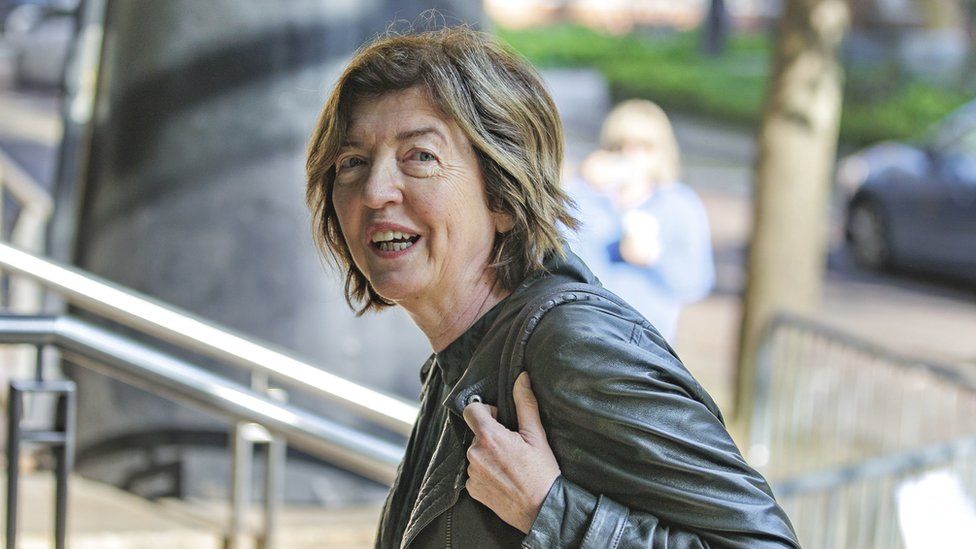
Sue Gray was giving evidence to the UK Covid Inquiry in its last day in Belfast
By Brendan Hughes & Marie-Louise Connolly
BBC News NI
Northern Ireland’s civil service was “reactive rather than proactive” at the start of the Covid pandemic, former senior official Sue Gray has said.
She was giving evidence at the UK Covid inquiry during its final day of evidence sessions in Belfast.
Ms Gray, who is currently Labour leader Sir Keir Starmer’s chief of staff, headed up Stormont’s Department of Finance between 2018 and 2021.
She also led the report into the Westminster Partygate scandal.
That critical report contributed to Boris Johnson’s resignation as prime minister in 2022.
What did Sue Gray tell the Covid inquiry?
Stormont’s power-sharing executive had been restored after a three-year hiatus in 2020, shortly before the pandemic reached Northern Ireland.
In her witness statement to the inquiry, Ms Gray said, in the absence of an executive, the civil service was often more reactive and that it was a “really pressured time”.
“The executive had just reformed, ministers were walking in the door as this was becoming clear what we would need to do,” she said.
“Relationships were still being formed between ministers and the civil service and the assembly was now back.
“I think it was a reactive nature.”
But Ms Gray said there were changes as the new government bedded in.
“I think that there had been movement, and I think a greater willingness and opportunity to perhaps share and seek information and work with others in other departments,” she added.
Ms Gray added there was a “culture issue about working in silos” in Stormont departments.
She said she “wouldn’t say it’s just for Northern Ireland,” but she agreed with the inquiry’s counsel that silo working is more pronounced at Stormont than Westminster.
Closing statements heard
Thursday is the final day of the UK Covid inquiry’s sitting in Belfast.
It has been hearing from politicians and experts over the last three weeks in relation to decision-making during the pandemic.
Counsel for the UK-Covid Bereaved Families, Brenda Campbell KC, said the path to understanding the truth for how their loved ones died has been “painful and bittersweet”.
She added evidence over the past three weeks has shown how things might have been different and that send-offs and the grieving process could have been easier.
Image source, Covid Inquiry
Brenda Campbell is representing the UK-Covid Bereaved Families at the inquiry
She also said the past few weeks has been littered with omissions and failings, including details of underfunding which left departments “ravaged and worn”.
The consequences of Sinn Féin attending the Bobby Storey funeral, as well as the delayed actions in November 2020, led to that “fateful spike in cases in January 2021”, Ms Campbell added.
Northern Ireland first minister, and Sinn Féin deputy leader, Michelle O’Neill apologised to the inquiry for attending the funeral of Mr Storey, a senior republican, during the pandemic, which led to claims she had broken coronavirus guidelines.
Continuing her closing statement, Ms Campbell described the policies surrounding hospital discharges as “reckless” and referred to a failure to stand up NICCMA (Northern Ireland Central Crisis Management Agency) to ensure a cross-governmental approach.
Ms Campbell was also critical of the “apparently boundless power” of chief medical officer Prof Sir Michael McBride, who wore “at least two hats”, and the failure to protect older people and those who were medically vulnerable.
Three weeks that ‘only scratched the surface’
Marie-Louise Connolly, BBC News NI’s health correspondent
The closing statement reveals three weeks of devastating evidence, where multiple major failures were identified in Northern Ireland’s handling of the pandemic.
In her closing remarks on behalf of the bereaved families, Ms Campbell acknowledged that questioning from Clair Dobbin KC had only scratched the surface.
She added that over the past three weeks, the public, the press and those attending the inquiry have had a glimpse of the high and lowlights of Northern Ireland’s Covid story.
Image source, Liam McBurney/PA Media
On the first day of the inquiry sitting in Belfast, bereaved families gathered outside with pictures of their loved ones
She also said there is a great deal of work to be done by those who represent the public and that work must start immediately.
Wrapping up, Ms Campbell said she would borrow the words of the late Mo Mowlam, a woman “who made an enormous impact on this part of the world”, to deliver a message on behalf of the bereaved families: “Bloody well get on and do it.”








